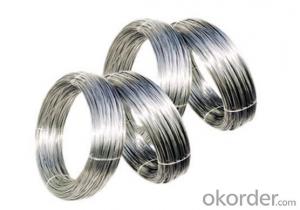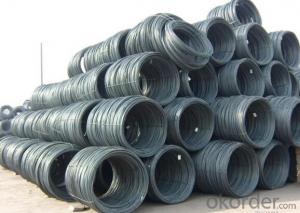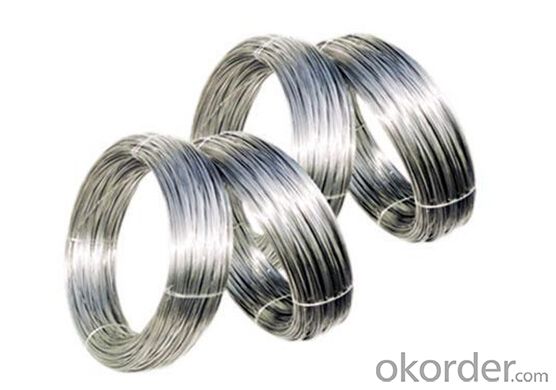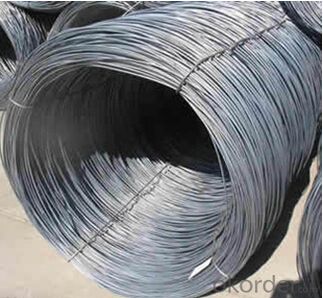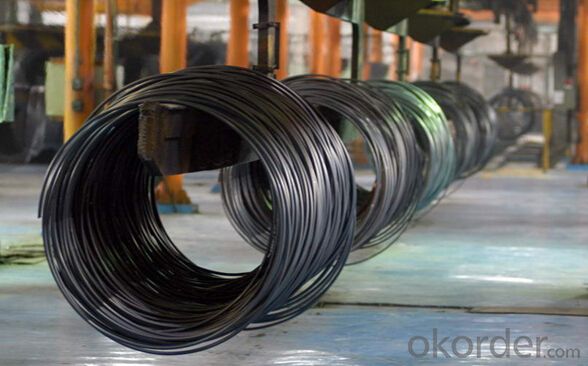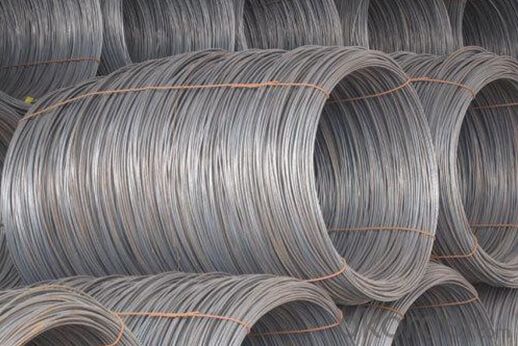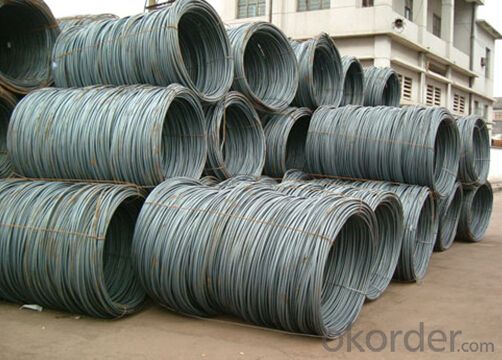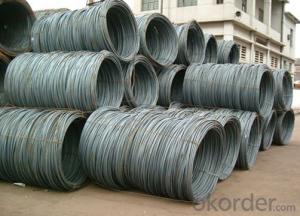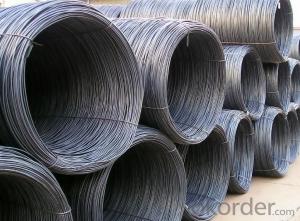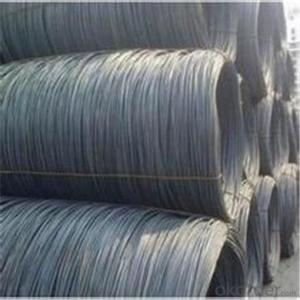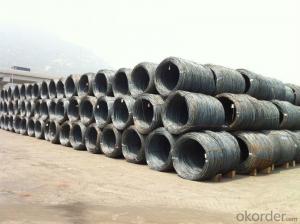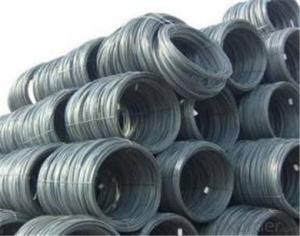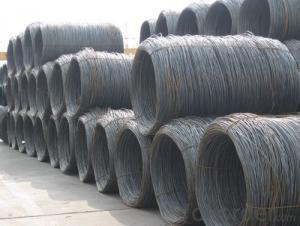5.5mm Grade SAE1008B Steel Wire Rod with Low Price
- Loading Port:
- Tianjin
- Payment Terms:
- TT OR LC
- Min Order Qty:
- 25 m.t.
- Supply Capability:
- 10000 m.t./month
OKorder Service Pledge
OKorder Financial Service
You Might Also Like
Specification
Grade SAE1008B Steel Wire Rod with Low Price
Specification
Steel Grade | Q195-Q235,Q235,SAE 1008-1018 Hot Rolled Steel Wire Rod |
Diameter | 5.5, 6.5, 7,8, 9,10, 12,14mm.etc. |
Coil weight | 1.8-2.1mts |
Application | drawing, construction materials, machinery parts, construction for Houses, Bridges, Roads,Packing |
Deliver Time | 25-30 days after receipt of L/C or deposit by T/T |
Packing | In coils, loading in container or by bulk vessel |
Payment terms | 1).100% irrevocable L/C at sight. |
2).30% T/T prepaid and the balance against the copy of B/L. | |
3).30% T/T prepaid and the balance against L/C |
Chemical Composition
Grade | Chemical Composition(%) | |||||
C | Mn | Si | S | P | Cr | |
SAE1006B | 0.03~O.07 | ≤0.32 | ≤0.30 | ≤0.045 | ≤0.040 | 0.3-0.35 |
Mechanical properties | ||||||
Yield strength(N/mm2) | Tensile strength(N/mm2) | Elongation(%) | ||||
250-280 | 350-380 | ≥32 | ||||
Grade | Chemical Composition(%) | |||||
C | Mn | Si | S | P | Cr | |
SAE1008B | 0.10max | 0.3~O.50 | 0.15max | 0.050max | 0.040 max | 0.3-0.35 |
Mechanical properties | ||||||
Yield strength(N/mm2) | Tensile strength(N/mm2) | Elongation(%) | ||||
≥195 | 315-430 | ≥30 | ||||
Company Information
CNBM International Corporation is the most import and export platform of CNBM group(China National Building Material Group Corporation) ,which is a state-owned enterprise, ranked in 270th of Fortune Global 500 in 2015.
With its advantages, CNBM International are mainly concentrate on Cement, Glass, Iron and Steel, Ceramics industries and devotes herself for supplying high quality series of refractories as well as technical consultancies and logistics solution.
After-sale service | CNBM provides the services and support you need for every step of our cooperation. We’re the business partners you can trust; you can relax and get on with doing business. |
For any problem, please kindly contact us at any your convenient time, we’ll reply you in our first priority within 24 hours | |
Advantages | Industry experience over 20 years. |
Shipment of goods -More than 70 countries worldwide. | |
The most convenient transport and prompt delivery. | |
Competitive price with best service. | |
High technical production line with top quality products. | |
High reputation based on best quality products. |
Products Show
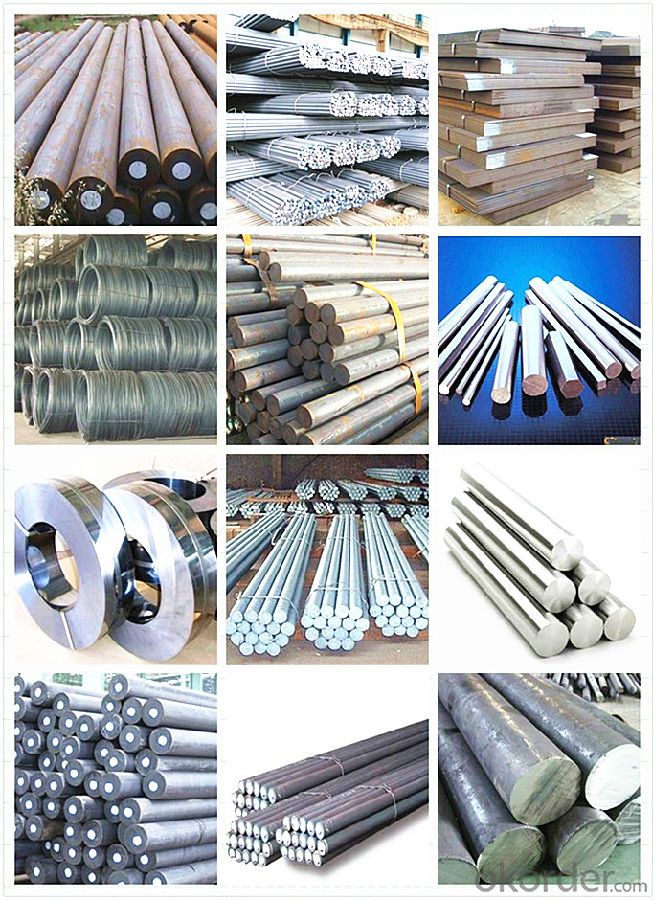
FAQ
Are you a trading company or manufacturer? | Manufacturer |
What’s the MOQ? | 3 metric ton |
What’s your delivery time? | 15-35 days after downpayment received |
Do you Accept OEM service? | Yes |
what’s your delivery terms? | FOB/CFR/CIF |
What's the Payment Terms? | 30% as deposit,70% before shipment by T/T |
Western Union acceptable for small amount. | |
L/C acceptable for large amount. | |
Scrow ,Paybal,Alipay are also ok | |
Why choose us? | Chose happens because of quality, then price, We can give you both. |
Additionally, we can also offer professional products inquiry, products knowledge train (for agents), smooth goods delivery, excellent customer solution proposals. | |
What's your available port of Shipment? | Main Port, China |
What’s your featured services? | Our service formula: good quality+ good price+ good service=customer's trust |
Where are your Market? | Covering more than 160 countries in the world |
- Q: What are the corrosion resistance properties of special steel?
- Special steels are known for their excellent corrosion resistance properties. These steels have specific alloying elements added to enhance their resistance to corrosion, making them highly resistant to rust and various corrosive environments. Their composition and surface treatment provide a protective barrier against chemical reactions, moisture, and other corrosive agents, ensuring their durability and longevity in various applications.
- Q: What are the different forging grades of special steel?
- In the market, there exists a variety of forging grades for special steel, each possessing its own distinctive characteristics and applications. Among the most frequently utilized forging grades are: 1. Carbon Steel: Noted for its exceptional strength and durability, carbon steel is a favored option for forging. Its hardness and toughness are determined by the varying levels of carbon present. Carbon steel forgings find widespread usage in the automotive, construction equipment, and machinery industries. 2. Alloy Steel: By incorporating diverse alloying elements, such as manganese, chromium, nickel, or molybdenum, into carbon steel, alloy steel is created. This augmentation enhances its strength, corrosion resistance, and wear resistance. The aerospace, defense, oil and gas, and power generation sectors extensively employ alloy steel forgings. 3. Stainless Steel: Stainless steel, an alloy resistant to corrosion, contains a minimum of 10.5% chromium. It boasts remarkable resistance against rust and staining, rendering it suitable for applications in harsh environments or where hygiene is of utmost importance. Stainless steel forgings are commonly employed in the food processing, chemical, and medical industries. 4. Tool Steel: Tailor-made for utilization in cutting tools, molds, and dies, tool steel exhibits high hardness, wear resistance, and toughness, enabling it to withstand elevated temperatures and heavy loads. Tool steel forgings are utilized in the production of drills, saw blades, punches, and an array of precision tools. 5. High-Speed Steel: High-speed steel, a specific type of tool steel, retains its hardness even when employed at high speeds. It incorporates additional elements such as tungsten, molybdenum, or vanadium, which enhance its resistance to heat and wear. High-speed steel forgings are employed in the production of cutting tools, drills, and milling cutters. 6. Maraging Steel: Maraging steel, a low-carbon, high-nickel steel alloy, is renowned for its extraordinary strength and toughness. Through heat treatment, it achieves high tensile strength while maintaining good ductility. Maraging steel forgings find extensive application in the aerospace, defense, and missile systems industries. These aforementioned examples merely represent a selection of the diverse forging grades of special steel available in the market. Each grade proffers distinct properties tailored to specific applications, ensuring the appropriate material can be chosen to meet desired performance and durability requirements.
- Q: How does special steel contribute to the aerospace safety?
- Special steel contributes to aerospace safety in several ways. Firstly, special steel alloys such as titanium and stainless steel are used in the construction of critical components like landing gear, engine parts, and structural elements. These alloys offer high strength-to-weight ratios, corrosion resistance, and excellent heat resistance, ensuring the durability and reliability of aerospace structures. Moreover, special steel plays a crucial role in manufacturing precision instruments and tools used in aerospace maintenance and repair. These tools are essential for maintaining the safety and functionality of aircraft, ensuring accurate measurements, and facilitating effective repairs. Furthermore, special steel is utilized in the production of safety-critical fasteners, such as bolts and screws, which hold various aircraft components together. These fasteners need to withstand extreme forces and vibrations during flight, and special steel materials provide the necessary strength and durability to ensure their reliability. Overall, the use of special steel in aerospace applications enhances the safety of aircraft by providing robust and reliable materials for construction, maintenance, and repair, ultimately contributing to the overall integrity and performance of aerospace systems.
- Q: What are the specific requirements for special steel used in the mining drill bit industry?
- The specific requirements for special steel used in the mining drill bit industry include high strength and hardness to withstand the extreme conditions of drilling, excellent wear resistance to withstand abrasion from rocks and minerals, good toughness to resist breakage and cracking, and high heat resistance to withstand the heat generated during drilling. Additionally, the steel should have good machinability to facilitate the manufacturing process of the drill bits.
- Q: How does special steel contribute to reducing product waste?
- Special steel contributes to reducing product waste by offering superior strength, durability, and corrosion resistance. This allows manufacturers to produce longer-lasting and more reliable products, minimizing the need for frequent replacements. Additionally, special steel's high precision and customization capabilities enable the creation of components with tight tolerances, reducing the risk of assembly errors and subsequent product failures. Consequently, special steel helps optimize product performance and longevity, thereby reducing waste generated from premature product disposal.
- Q: How does special steel contribute to the infrastructure development?
- Special steel contributes to infrastructure development in several ways. Firstly, special steel possesses high strength and durability properties, making it an ideal material for constructing bridges, buildings, and various infrastructure projects. Its strength allows for the creation of lighter and more efficient structures, reducing construction costs and increasing project lifespan. Additionally, special steel is corrosion-resistant, ensuring the longevity and reliability of infrastructure in harsh environments. Moreover, special steel is used in the production of construction equipment and machinery, enabling efficient and effective construction processes. Overall, special steel plays a crucial role in enhancing the safety, resilience, and sustainability of infrastructure development.
- Q: How does special steel contribute to the manufacturing of automotive engine components?
- The manufacturing of automotive engine components heavily relies on special steel to enhance their strength, durability, and performance. Special steel possesses unique properties that make it suitable for critical engine parts like crankshafts, camshafts, connecting rods, valve springs, and cylinder heads. The exceptional strength of special steel is one of its primary advantages in automotive engine components. Engine parts made from special steel can withstand high stress, heavy loads, and extreme temperatures without experiencing deformation or failure. This strength ensures that the engine operates efficiently and reliably, even under demanding conditions. Furthermore, special steel offers superior durability, which is crucial for the longevity and performance of engine components. Its resistance to wear, corrosion, and fatigue ensures that the engine parts maintain their functionality for an extended period. This durability translates into increased lifespan and reduced maintenance requirements for the engine, resulting in higher customer satisfaction and lower costs for vehicle owners. The use of special steel in automotive engine components also contributes to improved performance. Special steel allows for the creation of lightweight components, reducing the overall weight of the engine and enhancing fuel efficiency. Additionally, the high precision and dimensional accuracy achievable with special steel manufacturing processes result in better engine performance, reduced friction, and improved power output. Moreover, special steel exhibits excellent machinability, simplifying the manufacturing process of engine components. Its ability to be easily formed, cut, and shaped enables the production of complex designs and intricate features, leading to enhanced efficiency and performance in the final product. In conclusion, special steel plays a vital role in the manufacturing of automotive engine components due to its exceptional strength, durability, and performance. Its usage results in engines that are more reliable, efficient, and long-lasting, ultimately contributing to the overall quality and satisfaction of vehicles.
- Q: How does special steel contribute to the manufacturing of cutting blades?
- Special steel is crucial in the manufacturing of cutting blades as it offers exceptional hardness, durability, and resistance to wear and corrosion. These properties allow cutting blades to maintain sharpness for longer periods of time, resulting in more efficient and precise cutting operations. Additionally, special steel can be tailored to specific requirements, enabling the production of cutting blades suitable for different applications, such as those used in industries like automotive, aerospace, or construction.
- Q: How does special steel resist corrosion?
- Special steel resists corrosion due to the presence of specific alloying elements, such as chromium or nickel, which form a protective layer on the surface of the steel. This layer acts as a barrier, preventing oxygen and moisture from reaching the underlying steel and thus preventing the formation of rust or corrosion.
- Q: Can special steel be welded?
- Yes, special steel can be welded.
Send your message to us
5.5mm Grade SAE1008B Steel Wire Rod with Low Price
- Loading Port:
- Tianjin
- Payment Terms:
- TT OR LC
- Min Order Qty:
- 25 m.t.
- Supply Capability:
- 10000 m.t./month
OKorder Service Pledge
OKorder Financial Service
Similar products
Hot products
Hot Searches
Related keywords
